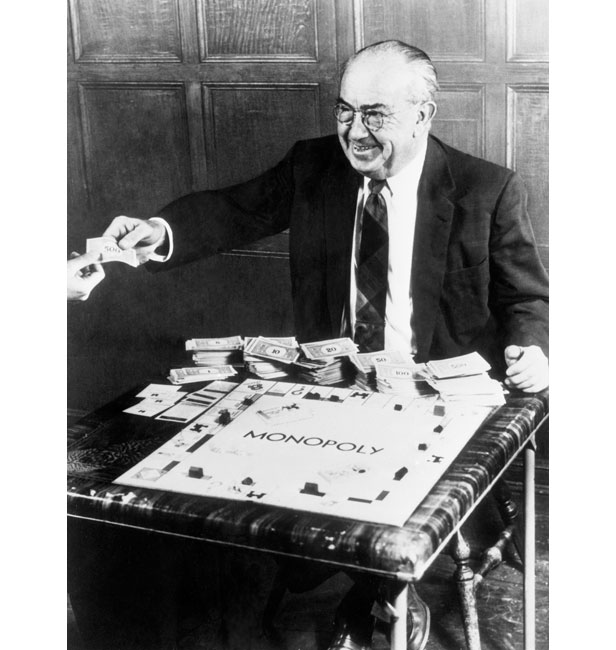The
progressive narrative about America’s skyrocketing levels of inequality
goes something like this: Since the 1970s or so, conservatives have
racked up a series of victories in rolling back government’s role in
taxing and regulating the rich and powerful. As a result, the rich and
powerful — who often lavish conservative politicians with donations —
have run roughshod over poor and middle-class people, sucking up a
horrifying proportion of the nation’s wealth in the process.
In their new book
The Captured Economy: How the Powerful Enrich Themselves, Slow Down Growth, and Increase Inequality,
Brink Lindsey and Steven M. Teles argue that this is only part of the
story. “What this approach misses is the role of government action
itself, rather than the government’s mere failure to act, as a cause of
inequality,” they write. This means that anyone concerned about
addressing inequality should be focusing on the many ways in which
government policy
itself actively redistributes money upward.
Lindsey,
vice-president and director of the Open Society Project at the Niskanen
Center, and Teles, a fellow at the Center and a political science
professor at Johns Hopkins, focus on four key areas in which, they say,
government policy has been ruthlessly taking money from the have-nots
and bestowing it upon the haves: finance, intellectual property (that
is, the patent system), occupational licensing, and land use.
Whereas
the standard progressive narrative about inequality and government
inaction is fairly intuitive, Lindsey and Teles’s arguments are
sometimes a bit more nuanced. Take their occupational-licensing case
study, for example: They argue that many state licensing laws pertaining
to physicians and attorneys are much more about artificially
constricting labor supply in these fields than any sort of compelling
quality-control argument, which in turn drives up the salaries of
physicians and lawyers (the desired effect from the physicians and
lawyers who lobby for strict licensing laws), which in turn drives up
costs for consumers, which in turn cuts off the access poor and
middle-class people have to the sometimes literally life-saving services
of a good attorney or physician.
What
this and other examples show is that sometimes the “conservative”
argument that deregulation and a scaling-back of government intervention
can reduce inequality is, well, true. It’s just complicated, and
depends on a lot on context. There’s no one-size-fits-all approach to
solving anything as complicated as America’s inequality crisis.
In
a recent email Q&A, Teles answered some questions about his book’s
theses and the ways he wished progressives would reframe their thinking
about inequality.
I
think the ways in which conservatives get inequality-talk wrong are
pretty well-documented among progressive-minded folks — among other
things, they have a delusional amount of misplaced faith in the power of
“the market” itself to bring about fair outcomes. But what’s your
elevator-pitch version for the ways in which progressives might
reconsider their own positions by reading your book?
Progressives
have a hard time seeing how much government policy actively contributes
to inequality by redistributing upwards. Progressives typically think
of inequality as the natural result of unrestrained markets and see more
government power as the solution. Yet in many important cases — in our
book we focus on financial regulation, intellectual property,
occupational licensing, and land-use regulation — misused government
power is the problem and greater reliance on markets is the egalitarian
solution.
Progressives
have no problem recognizing the political power of big corporations and
the rich, yet curiously their implicit assumption is that this power is
wielded with amazing restraint. They understand that the rich and
powerful can unfairly dominate the policymaking process, but their main
worry is that they will use their power to restrain government — to keep
their taxes and regulatory compliance costs inappropriately low. But
doesn’t it make sense that if you have all this power, you’ll use it for
more than just playing defense? If you’ve got that power, you can go on
offense as well, empowering government to restrain competition from
outsiders so that the rich and powerful benefit at the expense of
everybody else. And that is precisely what has happened.
Maybe
one reason for the progressive blind spot you mention is that
government regulation used to have much more progressive distributional
consequences — that is, it did a lot of redistributing from richer to
poorer. You argue that the main action is now in the other direction; in
your words, “rent-seeking,” or lobbying for special privileges, “has
moved upmarket.” Explain what’s happened.
What
economists call rent-seeking is bad for economic efficiency by
definition: it’s the attempt to make profits through the political
process rather than by creating value for customers. The effects on the
distribution of income, however, are unclear: rent-seeking could be
progressive, regressive, or a wash. When the era of activist government
really kicked off during the New Deal, lots of regulatory interventions
in the economy — some of which we consider bad policies that stifled
competition and cartelized industries — nonetheless had progressive
consequences. Think rent control, universal service requirements, and of
course pro-union labor legislation. Even when policies favored big
business, those businesses frequently had large, semi-skilled, unionized
workforces, so some of the rents got shared with workers in the form of
higher pay. In more recent decades, though, regulatory interventions
that favor the rich have been the norm.
One
reason is the decline of unions: nothing has replaced them as a
muscular lobby for government interventions on behalf of the
less-well-off. Meanwhile, the biggest, most technologically progressive
industries (which are usually the focus of regulatory activity) now hire
mostly highly skilled workers. So subsidies to these companies don’t
leak out much to ordinary workers.
Isn’t
it simply the case that a ton of powerful progressives benefit greatly
from the rent-seeking you document in the book? I don’t expect the
doctors and lawyers and finance types who provide the Democratic Party
with a big chunk of its funding, for example, to be all that sympathetic
to the idea that they’re contributing to the inequality some of them
rail against every two or four years. This seems like a pretty serious
impasse.
When
we were writing the book, we joked that we were doing our best to
antagonize the very people most likely to read a serious nonfiction book
from Oxford University Press: doctors, lawyers, financial
professionals, and affluent homeowners in big coastal cities. But you’re
right, we’re also picking fights with some of the biggest funding
sources for the Democratic Party: Wall Street, Hollywood, and Silicon
Valley. You can see our book as a critique of progressives from the
free-market left. The Affordable Care Act didn’t do nearly enough to
address doctors’ inflated fees and incomes; Dodd-Frank didn’t do nearly
enough to roll back the regulatory subsidies for financialization and
excessive risk-taking.
Of
course what we’re proposing is difficult. It’s never easy to take
privileges away from a well-organized lobby, especially when it
represents the interests of extremely rich and powerful people......
MORE








 Around
1900, Scott Nearing was introduced to The Landlord's Game by either
Lizzie Magie or other residents of Arden. He was at the time a full-time
resident of Arden. Nearing went on to become a member of the economics
department at the University of Pennsylvania in 1906, where he used The
Landlord's Game in his teaching. His support of Henry George's proposals
to raise pubic revenue exclusively from those who owned land, and his
opposition to child labor, caused him to be dismissed from the
university in 1915.
Around
1900, Scott Nearing was introduced to The Landlord's Game by either
Lizzie Magie or other residents of Arden. He was at the time a full-time
resident of Arden. Nearing went on to become a member of the economics
department at the University of Pennsylvania in 1906, where he used The
Landlord's Game in his teaching. His support of Henry George's proposals
to raise pubic revenue exclusively from those who owned land, and his
opposition to child labor, caused him to be dismissed from the
university in 1915.












